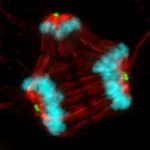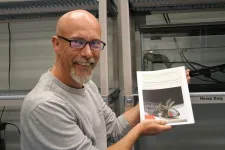(Press-News.org) One of the most common injuries sustained by military personnel in recent conflicts has been traumatic brain injury, or TBI. In response to this, and the fact that military operations are increasingly being conducted by small teams in far-flung areas, researchers in the University of Arizona College of Medicine – Tucson’s Department of Psychiatry are working on a portable virtual reality system to assess TBI in the field.
Psychiatry professor William “Scott” Killgore, PhD, and his team in the Social, Cognitive and Affective Neuroscience Lab were recently awarded a $1.5 million grant from the Department of Defense’s United States Army Medical Research Acquisition Activity division to develop a VR assessment system for TBI.
“While most TBIs are mild, such as in the case of a concussion, being able to quickly assess the level of injury is imperative to a service member’s recovery,” Killgore said. “Traditionally, comprehensive neuropsychological assessments are conducted by highly trained professionals who typically have a doctoral degree in clinical psychology and certification in neuropsychology. That is not feasible in remote locations under combat conditions.
“We aim to capitalize on recent advances in artificial intelligence, machine learning and computational neuroscience to develop a lightweight, portable, virtual reality assessment system that can rapidly assess multiple dimensions of cognitive performance – in the field – simultaneously.”
The project, Model Development and Translation of a Virtual Reality Military Operational Neuropsychological Assessment, or VRMONA, will utilize use a type of AI known as deep learning neural networks to identify neuropsychological deficits during a relatively brief interactive and ecologically valid VR combat-related “game.”
During this brief “game,” the participant will utilize a VR headset and hand sensor system to engage in an immersive set of scenarios relevant to the military. The immersive VR system will allow simultaneous assessment of a variety of neurocognitive domains in real time while the subject interacts with the system’s posed problem scenarios.
As part of the realistic exercise, the participant engages in combat-relevant activities involving friend-or-foe discrimination, visual and auditory perception, situational awareness, decision-making and communication. Throughout the immersive experiences, the system collects data regarding examinee responses, such as accuracy, response time, motor coordination and inhibition.
The data will be extracted in real-time and analyzed using machine learning algorithms to assess the major domains of neuropsychological performance.
Through the use of VR technology, it will be possible to assess ecologically valid military scenarios, where test performance predicts behaviors in real-world settings, that cannot be practicably and reliably assessed through simple observation or traditional paper-and-pencil neuropsychological tests.
“Dr. Killgore and his team are conducting state-of-the-art research utilizing cutting-edge technologies,” said Jordan Karp, MD, psychiatry professor and department chair. “By incorporating the machine learning of deep neural networks, the SCAN Lab will train the VR system to identify multiple cognitive abilities impacted by TBI. The development of this system can eventually assist in both military and civilian uses.”
In the future, such VR assessment systems could be tailored to a variety of occupational specialties to facilitate precision assessments of TBI.
“VRMONA can be applied in a dual-use capacity across civilian and military contexts, including medical, sport, first responder and other settings. It will allow a rapid assessment of neurocognitive abilities in a matter of minutes rather than hours, and at an extremely fine-grained level that is not possible with contemporary assessment batteries,” Killgore said. “This could represent a paradigm shift in standard neuropsychological assessment.
“Overall, the VRMONA has potential to significantly advance cognitive assessment capabilities in remote locations,” Killgore added. “This will significantly increase the survivability and readiness of U.S. soldiers and will enhance the overall health of military personnel and readiness of the armed forces.”
END
$1.5 million DOD grant will create virtual reality test to assess TBI in the field
College of Medicine – Tucson researchers will create a portable virtual reality device to quickly assess traumatic brain injuries when and where they occur
2023-10-27
ELSE PRESS RELEASES FROM THIS DATE:
Antibody-drug conjugate helps patients with metastatic non-small cell lung cancer live longer, delaying disease progression
2023-10-27
Treatment with datopotamab deruxtecan (Dato-DXd), a novel Trop-2 directed antibody-drug conjugate, was found to significantly improve progression-free survival in patients with metastatic non-small cell lung cancer, an improvement that was primarily driven by patients with non-squamous tumors.
These results from the TROPION-Lung01 Phase III trial, which compared the standard of care in second-line docetaxel, a type of chemotherapy, with Dato-DXd, an antibody drug conjugate, in patients with pretreated metastatic non-small cell lung cancer, were presented at the European Society for Medical Oncology 2023 Congress by Dr. Aaron ...
UTHSC cancer researcher part of $3 million collaborative project studying obesity-related cancer
2023-10-27
A University of Tennessee Health Science Center (UTHSC) researcher is a member of a prestigious team that has just received a highly competitive Endeavor Award totaling $3 million from The Mark Foundation for Cancer Research.
Liza Makowski, PhD professor in Hematology and Oncology at the UTHSC Center for Cancer Research, is a co-principal investigator on the award, which funds collaborative projects tackling complex challenges in the prevention, diagnosis, and treatment of cancer. Entitled “Inflammatory Drivers of The Obesity-Cancer Connection”, the project is led by principal ...
Common chemotherapy drugs don't work like doctors thought, with big implications for drug discovery
2023-10-27
A new study from the University of Wisconsin–Madison suggests that chemotherapy may not be reaching its full potential, in part because researchers and doctors have long misunderstood how some of the most common cancer drugs actually ward off tumors.
For decades, researchers have believed that a class of drugs called microtubule poisons treat cancerous tumors by halting mitosis, or the division of cells. Now, a team of UW–Madison scientists has found that in patients, microtubule poisons don't actually stop cancer cells from dividing. Instead, these drugs alter ...
SynGAP Research Fund awards $100,000 for investigating the impact of SYNGAP1 missense variants using structural bioinformatics
2023-10-26
TURKU, Finland – October 27, 2023 – The SynGAP Research Fund 501(c)(3) announced a $100,000 grant to researchers Pekka Postila and Olli Pentikäinen from the Institute of Biomedicine and InFLAMES Flagship at the University of Turku. Prof. Pentikäinen’s research focuses on molecular modeling and computer-aided drug discovery. Assoc. Prof. Postila is an expert on advanced molecular dynamics simulations of complex biomolecular systems. The dual research team was formed to study the structural effects of missense variants on the SynGAP protein, whose normal functioning ...
Something to chew on: Researchers look for connections in how animals eat and digest food
2023-10-26
Oct. 26, 2023
Media contacts:
Emily Gowdey-Backus, director of media relations, Emily_GowdeyBackus@uml.edu
Nancy Cicco, assistant director of media relations, Nancy_Cicco@uml.edu
UMass Lowell’s Nicolai Konow wants to bridge the gap between research on food processing and nutrient absorption.
“There is a divide between biomechanists, who study chewing and food transport, and physiologists, who examine what actually happens to food in the gastrointestinal tract,” said the assistant professor ...
Viral reprogramming of cells increases risk of cancers in HIV patients
2023-10-26
Viral infections are known to be a central cause of more than 10% of cancers worldwide. University of California researchers may have uncovered one of the key reasons why. Their findings were published today in PLOS Pathogens, a journal that reports groundbreaking work to advance understanding of how pathogens impact diseases such as cancer.
UC Davis Comprehensive Cancer Center researcher Yoshihiro Izumiya teamed up with Michiko Shimoda, who previously worked in the Izumiya Lab at UC Davis. Currently, she is a member of the Core Immunology Lab at UC San Francisco. Together, they led UC Davis researchers in the study of Kaposi’s sarcoma-associated herpesvirus (KSHV). The ...
Robot stand-in mimics movements in VR
2023-10-26
Media Note: Pictures of VRoxy can be viewed and downloaded here: https://cornell.box.com/v/VRoxyrobotproxy
ITHACA, N.Y. – Researchers from Cornell and Brown University have developed a souped-up telepresence robot that responds automatically and in real-time to a remote user’s movements and gestures made in virtual reality.
The robotic system, called VRoxy, allows a remote user in a small space, like an office, to collaborate via VR with teammates in a much larger space. VRoxy represents the latest in remote, robotic embodiment.
Donning a VR headset, a user has access to two view modes: Live mode shows an immersive image of the ...
Major milestone achieved in new quantum computing architecture
2023-10-26
Coherence stands as a pillar of effective communication, whether it is in writing, speaking or information processing. This principle extends to quantum bits, or qubits, the building blocks of quantum computing. A quantum computer could one day tackle previously insurmountable challenges in climate prediction, material design, drug discovery and more.
A team led by the U.S. Department of Energy’s (DOE) Argonne National Laboratory has achieved a major milestone toward future quantum computing. They have extended the coherence time for their novel type of qubit to an impressive 0.1 milliseconds — nearly a thousand times better than the previous record.
“Rather ...
"Recognition of human right to the environment can galvanize action and collaboration towards realization of sustainable development goals," eminent environmental lawyer says
2023-10-26
Amsterdam, October 26, 2023 – "The Human Right to the Environment affirms the right to life itself. When humans protect nature, they are also securing human health and wellbeing." An article by eminent environmental lawyer Prof. Nicholas A. Robinson sees the recognition of the Human Right to the Environment (HRE) as a first step in a long process of restoring a healthy environment for people and the planet.
Professor Robinson’s article is published in a special issue of the Journal of Environmental Policy and Law on The Human Right to Sustainable Environment. In the preface Editor-in-Chief Bharat H. Desai, PhD, Jawaharlal Nehru University, Centre ...
New tool measures food security duration, severity
2023-10-26
ITHACA, N.Y. – Researchers from the Charles H. Dyson School of Applied Economics and Management have developed a new method for measuring food insecurity, which for millions of people in the U.S. is more than just an abstract concept.
The group’s probability of food security (PFS) measures the likelihood that a household’s food expenditures equal or exceed the minimum cost of a healthful diet. The researchers then put the PFS to the test, analyzing food security dynamics over a recent 17-year period, and found that a third of U.S. households experienced at least temporary food insecurity.
Seungmin Lee, a doctoral student in the field of applied economics and management, ...
LAST 30 PRESS RELEASES:
Novel structural insights into Phytophthora effectors challenge long-held assumptions in plant pathology
Q&A: Researchers discuss potential solutions for the feedback loop affecting scientific publishing
A new ecological model highlights how fluctuating environments push microbes to work together
Chapman University researcher warns of structural risks at Grand Renaissance Dam putting property and lives in danger
Courtship is complicated, even in fruit flies
Columbia announces ARPA-H contract to advance science of healthy aging
New NYUAD study reveals hidden stress facing coral reef fish in the Arabian Gulf
36 months later: Distance learning in the wake of COVID-19
Blaming beavers for flood damage is bad policy and bad science, Concordia research shows
The new ‘forever’ contaminant? SFU study raises alarm on marine fiberglass pollution
Shorter early-life telomere length as a predictor of survival
Why do female caribou have antlers?
How studying yeast in the gut could lead to new, better drugs
Chemists thought phosphorus had shown all its cards. It surprised them with a new move
A feedback loop of rising submissions and overburdened peer reviewers threatens the peer review system of the scientific literature
Rediscovered music may never sound the same twice, according to new Surrey study
Ochsner Baton Rouge expands specialty physicians and providers at area clinics and O’Neal hospital
New strategies aim at HIV’s last strongholds
Ambitious climate policy ensures reduction of CO2 emissions
Frontiers in Science Deep Dive webinar series: How bacteria can reclaim lost energy, nutrients, and clean water from wastewater
UMaine researcher develops model to protect freshwater fish worldwide from extinction
Illinois and UChicago physicists develop a new method to measure the expansion rate of the universe
Pathway to residency program helps kids and the pediatrician shortage
How the color of a theater affects sound perception
Ensuring smartphones have not been tampered with
Overdiagnosis of papillary thyroid cancer
Association of dual eligibility and medicare type with quality of postacute care after stroke
Shine a light, build a crystal
AI-powered platform accelerates discovery of new mRNA delivery materials
Quantum effect could power the next generation of battery-free devices
[Press-News.org] $1.5 million DOD grant will create virtual reality test to assess TBI in the fieldCollege of Medicine – Tucson researchers will create a portable virtual reality device to quickly assess traumatic brain injuries when and where they occur



